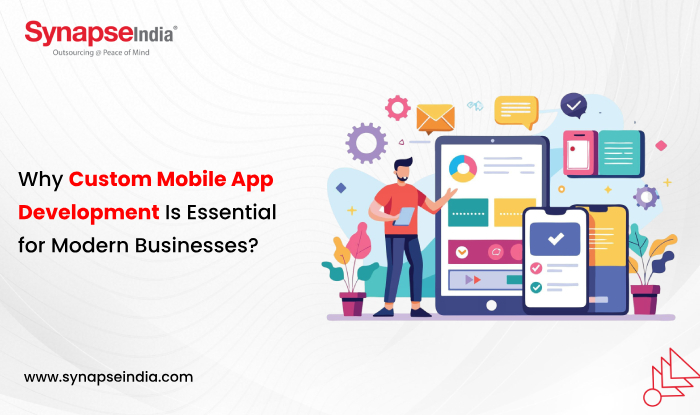 27 Nov 2025
27 Nov 2025
Mobile apps have become a primary interaction channel for customers. People expect smooth digital experiences that match their specific needs. Generic, one-size-fits-all apps no longer offer enough differentiation or efficiency. This is where custom mobile application development creates a clear advantage. Tailored features, stronger security, and seamless workflows give modern businesses the ability to connect, serve, and grow in ways that standard apps simply cannot match.
The global mobile app market is expected to reach $756 billion by 2027, at a CAGR of 8.58% during 2022-2027. (Statista)

Generic apps follow general market requirements. Custom mobile application development follows your business model and user expectations.
When users find exactly what they need with fewer steps, loyalty becomes stronger, and business outcomes improve naturally.
There were 12.5 billion apps downloaded in the United States in 2023. (Business of Apps, 2025)
Customer expectations evolve constantly. A custom app adapts with them instead of staying rigid like readymade solutions.
38% of users prefer engaging only with websites that feature a visually appealing and well-structured layout. (Forbes)
Customers feel that the brand understands and values their needs, which builds trust and repeat usage.
Absolutely. Behind the scenes, mobile app custom development automates tasks, unifies workflows, reduces manual effort, and keeps operations efficient as the business evolves.
Employees complete tasks faster, managers get clear visibility, and businesses reduce errors that come from disconnected tools.
Customers move across devices constantly, and businesses operate on multiple channels, so custom apps ensure seamless, connected experiences everywhere.
This makes customers more likely to continue their journey instead of dropping off midway.
Generic security fails specific risks. Custom mobile apps development adds tailored protections that strengthen data privacy and safeguard business operations effectively.
Stronger security controls via custom app development reduce breaches, maintaining customer trust and business reputation.
Yes. Custom apps scale with business growth, supporting new users, features, integrations, and technology upgrades without costly rebuilds or disruptions.
Custom solutions evolve with changing goals, enabling new features, smoother upgrades, and continuous improvement without limiting growth.
In highly competitive markets, differentiation matters. Custom apps can provide unique value that competitors cannot easily copy.
| Business Focus | Custom Advantage |
| Retail | Personalized shopping journeys, loyalty features |
| Healthcare | Secure patient data management, teleconsulting support |
| Real Estate | Virtual tours, personalized property suggestions |
| Education | Interactive learning environments and progress tracking |
| Logistics | Real-time tracking, optimized routing |
Custom mobile application development ensures the digital product reflects the true value of the brand.
While readymade apps may look cheaper at launch, limitations appear later through customization restrictions, higher maintenance costs, or licensing fees.
Custom apps reduce long-term spending by:
Businesses maintain full control and avoid sudden pricing changes from third-party platforms.

Custom mobile app development is not just a technology choice. It is a growth strategy. Personalized features, automated workflows, seamless customer experiences, and future-friendly architecture make custom solutions essential for modern businesses that want to lead rather than follow. With the right mobile app development services, companies can innovate confidently, respond faster to market needs, and build stronger customer relationships that last.
Custom development builds features based on your business needs and integrates deeply with internal tools, while generic apps offer preset functions with limited flexibility.
Retail, healthcare, logistics, education, fitness, finance, and hospitality see major improvements because their operations require personalization and process automation.
It depends on features, platform choices, and integrations. The development timeline is planned based on business goals and technical complexity.
Yes. Regular updates, security improvements, and new features ensure the app continues to perform smoothly and adapt to changing needs.
Custom apps allow tailored security measures, restricted data access, compliance-focused controls, and more robust protection from cyber threats.

